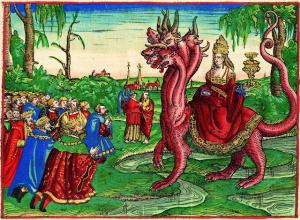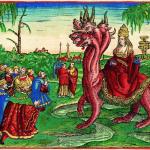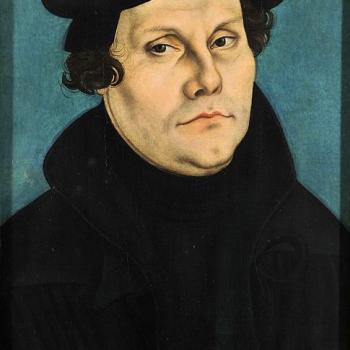Sola Scriptura: Self-Defeating; Church Hierarchy; Jerusalem Council
The late Steve Hays (1959-2020) was a Calvinist (and anti-Catholic) apologist, who was very active on his blog, called Triablogue (now continued by Jason Engwer). His 695-page self-published book, Catholicism — a collection of articles from his site — has graciously been made available for free. On 9 September 2006, Hays was quite — almost extraordinarily — charitable towards me. He wrote then:
I don’t think I’ve ever accused him of being a traitor or apostate or infidel. . . . I have nothing to say, one way or the other, regarding his state of grace. But his sincerity is unquestionable. I also don’t dislike him. . . . I don’t think there’s anything malicious about Armstrong—unlike some people who come to mind. In addition, I don’t think I’ve ever said he was unintelligent. For the record, it’s obvious that Armstrong has a quick, nimble mind.
Two-and-a-half years later, starting in April 2009 and up through December 2011 (in the following quotations) his opinion radically changed, and he claimed that I have “an evil character,” am “actually evil,” “ego-maniac, narcissist,” “idolater,” “self-idolater,” “hack who pretends to be a professional apologist,” given to “chicanery,” one who doesn’t “do any real research,” “a stalwart enemy of the faith . . . no better than [the atheists] Richard Dawkins or Christopher Hitchens,” with an intent to “destroy faith in God’s word,” “schizophrenic,” “emotionally unhinged,” one who “doesn’t trust in the merit of Christ alone for salvation,” “has no peace of mind,” “a bipolar solipsist,” “split-personality,” and a “bad” man. He wasn’t one to mince words! See more gory details.
I feel no need whatsoever to reciprocate these silly and sinful insults. I just wanted the record to be known. I’ve always maintained that Hays was a very intelligent man, but habitually a sophist in methodology; sincere and well-meaning, but tragically and systematically wrong and misguided regarding Catholicism. That’s what I’m addressing, not the state of his heart and soul (let alone his eternal destiny). It’s a theological discussion. This is one of many planned critiques of his book (see my reasons why I decided to do this). Rather than list them all here, interested readers are directed to the “Steve Hays” section of my Anti-Catholicism web page, where they will all be listed. My Bible citations are from the RSV. Steve’s words will be in blue.
*****
[Chapter 12: Sola Scriptura]
What does sola scriptura mean?
It’s become a Catholic trope to say that sola scriptura is self-contradictory, and I’ve seen Protestant apologists struggle with that charge. [p. 621]
It’s not a trope; it’s a truth.
The historic target of sola scriptura is the papacy and post-apostolic church councils. Sola scripture is the claim that there are no infallible post-apostolic church councils. Likewise, that God didn’t institute the papacy. The pope is not a divine mouthpiece. [p. 621]
Yes, that’s how Martin Luther was forced to adopt the position, by default. He didn’t like Catholic authority so he had to come up with something else. As it was, he was forced into a corner in in the Leipzig Disputation in 1519. This is not how major Christian beliefs ought to originate.
Apropos (iii), suppose a Catholic apologist asks us where do we find that in the Bible? [p. 621]
It’s a perfectly valid and expected question, seeing as Protestants have made Scripture the sola infallible authority. So if sola Scriptura isn’t found in the Bible itself, then it’s simply a fallible tradition of men, to which I ask: why should anyone believe it? At the very least it should be, and we would expect it to be in the inspired Bible, if in fact it’s true.
But that’s the point–we don’t find the papacy in the Bible. [p. 621]
The papacy is all over the New Testament, in the form of Petrine primacy, as I have massively demonstrated.
And we don’t find divine promises to inspire post-apostolic church councils in the Bible. We find promises to the apostles. But we don’t find comparable promises to bishops or post-apostolic church councils. [p. 621]
What we find is the Jerusalem council, which consisted of both apostles and elders (Acts 15:2, 4, 6). It — led by Peter the first pope (15:7-14) — promulgated an infallible decree for all Christians (Acts 16:4), which was indeed inspired by the Holy Spirit (15:28). This is altogether adequate as a representative model of how Christian councils (as a matter of ecclesiology) would work all through history. It’s pointless to believe that such an event would be written about in the Bible, but at the same time pretend that it has no relevance for the rest of Christian history. By the same reasoning, it’s foolish to accept Petrine primacy (as many Protestant scholars do) but think that it has nothing to do with the papacy or papal succession. Why should it only be there in the mid-1st century and then disappear?
Catholics appeal to Acts 15, but apostles along with a sibling of Jesus were participants. So that’s no precedent for post-apostolic church councils. [p. 621]
It also consisted of “elders”: which the text states about six times. So it has all the relevance in the world for future councils.
Moreover, Catholics distinguish between local councils and ecumenical councils. But we don’t find that distinction in Scripture. [p. 622]
We do find the prototype of the latter in the Jerusalem council: it was presided over by the person who is presented in the Bible as the leader of the early Christian Church. It made a decree that bound all Christians and which, indeed, has been held by virtually all Christians since that time. Paul went around proclaiming it in cities far away in Asia Minor. Therefore, it was not merely a local council. It was in Jerusalem, which was at that time the center of world Christianity, just as the councils Vatican I and II were held in Rome: the center of world Christianity.
Destination unknown
Because the Bible is a finished product, it contains no surprises. We know what we’re getting. We know what to expect. [p. 623]
Why is it, then, that Protestants have endless internal disputes, if the Bible is formally sufficient to function as their rule of faith?
How to read a map
To begin with, this isn’t a hypothetical question for Protestants. We believe in sola Scriptura because that is how God in fact chooses to operate. [p. 624]
This is circular reasoning. We only know, in the final analysis, how God operates by the Bible: His inerrant and inspired revelation. But that Bible doesn’t teach sola Scriptura. It’s a man-made, extrabiblical tradition of men: exactly what Jesus taught us to avoid.
The question of sola Scriptura
I like to keep up with the competition. Brand Pitre is one of the best younger generation Catholic apologists. [p. 625]
Really? He didn’t “keep up” with me. I wrote a book critiquing sola Scriptura from the Bible, published by Catholic Answers in 2012, and a second self-published one in the same year that tackled two Anglicans, widely considered to be among the best historic defenders of this false position, and I’ve written more articles on this topic than any other one. But because Hays had by then concluded that I was “evil” and “schizophrenic,” etc. he had no interest in critiquing my books (like James White did: twice) or articles. Even if he thought I was a terrible, lousy apologist (as he did, post-2009), here was his golden opportunity to dismantle my book and be the great champion for sola Scriptura. It’s not like I am a nobody in Catholic apologetics.
All of the active anti-Catholic apologists of our time — including Hay’s colleague and successor on his blog, Jason Engwer — have dealt with my material; some of them quite a bit and for several years. But something about my work threatened ands unnerved Hays to such an extent that he felt he had to hurl every insult imaginable my way, in order to besmirch my name and character, so that his followers would ignore me. Of course that is no refutation at all of my arguments.
i) Believe and obey divine revelation
ii) Don’t elevate non-revelation to the status of divine revelation
iii) Disregard whatever is contrary to divine revelation
Scriptures teaches these propositions. That’s sola Scriptura in a nutshell. [p. 630]
No it’s not. Catholics believe all three of these things as much as Protestants do, yet we don’t hold to sola Scriptura, which means, according to the standard Protestant definition: “Scripture is the only infallible and final authority for Christian doctrine.” Our position is that the Bible itself teaches that there is an authoritative, infallible tradition and Church, so that if you accept all of biblical teaching, you arrive at the Catholic “three-legged stool” rule of faith.
***
This concludes my examination of the late Steve Hays’ “book” Catholicism. He obviously enjoyed and relished taking potshots at Catholicism and playing games with his usual sophistry. My next and last project having to do with him will be my multi-part examination of his “book” Biblical Calvinism, which is 819 pages. It’s a whole different ballgame comprehensively presenting and defending one’s own position. I suspect that he will offer far more serious arguments and less sophistry in this book. I will relentlessly offer counter-arguments from the Bible. It’s nothing new for me. I have devoted two books and part of a third to debunking Calvinism and have large Calvin and Calvinism web pages, including massive line-by-line responses to large portions of Calvin’s Institutes of the Christian Religion. I know the arguments, and I know how to refute them: primarily from the Bible.
***
Practical Matters: Perhaps some of my 4,300+ free online articles (the most comprehensive “one-stop” Catholic apologetics site) or fifty-one books have helped you (by God’s grace) to decide to become Catholic or to return to the Church, or better understand some doctrines and why we believe them.
Or you may believe my work is worthy to support for the purpose of apologetics and evangelism in general. If so, please seriously consider a much-needed financial contribution. I’m always in need of more funds: especially monthly support. “The laborer is worthy of his wages” (1 Tim 5:18, NKJV). 1 December 2021 was my 20th anniversary as a full-time Catholic apologist, and February 2022 marked the 25th anniversary of my blog.
PayPal donations are the easiest: just send to my email address: apologistdave@gmail.com. You’ll see the term “Catholic Used Book Service”, which is my old side-business. To learn about the different methods of contributing, including 100% tax deduction, etc., see my page: About Catholic Apologist Dave Armstrong / Donation Information. Thanks a million from the bottom of my heart!
***
Photo credit: The Whore of Babylon (workshop of Lucas Cranach): colorized illustration from Martin Luther’s 1534 translation of the Bible [public domain / Wikimedia Commons]
***
Summary: The late Steve Hays was a Calvinist and anti-Catholic writer and apologist. This is one of my many critiques of Hays’ “Catholicism”: a 695-page self-published volume.


















